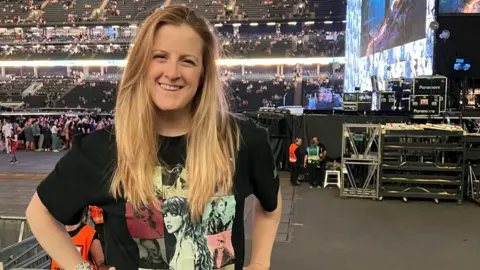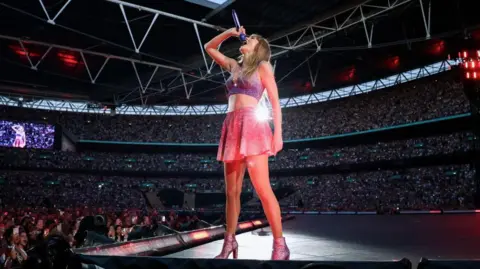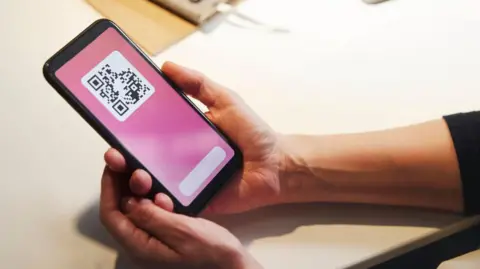[ad_1]
 Jacki Thrapp
Jacki ThrappFor Nashville native Jacki Thrapp flying to Europe this summer season to see her idol Taylor Swift carry out reside was a “no brainer”.
With the most cost effective tickets for the remaining US dates of Swift’s persevering with Eras Tour now costing $2,500 (£2,000) on the resale market, up from their face worth of $49, some American followers realised that it could be cheaper for them to fly throughout the Atlantic to catch one of many European exhibits as an alternative.
So again in May, Jacki went to see Swift carry out twice in Sweden, with every ticket costing her lower than $200.
“Americans are paying so much money, and a lot of Taylor Swift fans are people in their 20s and 30s,” says the 32-year-old. “We’re paying so much money to see her in the US when a lot of us still can’t even afford a house.”
Although Jacki purchased two Swedish tickets on the secondary market, the mark-up of the costliest was solely round double its face worth. This is claimed to be as a result of shopping for resold tickets will not be a longtime factor to do in Sweden, in contrast to within the US and UK.
In different European nations, corresponding to Germany, tickets can’t be resold at greater than 25% above their face worth. Meanwhile, some nations go even additional. Italy, Portugal and the Republic of Ireland all have legal guidelines in place that forestall live performance tickets being offered above their authentic value.
In the UK and the US the worth of re-sold tickets can at the moment be as excessive as persons are prepared to pay. In April, 250 musical artists, together with Billie Eilish and Cyndi Lauper, signed an open letter that attacked “predatory resellers”, and known as the present ticking system “broken”.
The scenario might change for the higher within the UK within the subsequent few years, because the Labour Party, which types the brand new authorities, stated in March that it deliberate to cap the resale value of tickets.
Yet legal guidelines stopping extreme pricing on the secondary market don’t cease two key points – touts getting their palms on extreme quantities of tickets within the first occasion, and the danger of individuals shopping for counterfeit tickets or being scammed.
The latter is claimed to have affected lots of of Taylor Swift followers who tried to purchase tickets for her concert events within the UK this summer season.
 Getty Images
Getty ImagesAsher Weiss, chief government of ticketing start-up Tixologi, believes that expertise is the answer, notably AI.
“People [touts] will buy a ticket and list it on multiple marketplaces for secondary sale,” he says. “And then even if it sells on one, they won’t take it down off the other one.
“So multiple people end up with the same ticket, trying to get in,” explains Mr Weiss, whose agency is predicated in Los Angeles.
To forestall folks shopping for extreme numbers of tickets, he says that Tixologi’s AI “will be able to flag people making multiple purchases from the same IP address as unusual purchasing behaviour”.
“That would prevent those bad actors, and protect the true fans and customers,” provides Mr Weiss.
His agency can be ready to make sure that just one copy of a ticket can ever exist. It does this through the use of blockchain, the expertise that underpins cryptocurrencies. This prevents duplication.
Tixologi’s digital tickets even have a rotating QR code that’s stated to be extraordinarily tough to repeat, in order that pretend ones are immediately noticed when scanned. And a venue or artist can choose a operate known as “disable transfers”, which prevents a consumer from emailing the ticket to another person. This makes them a lot tougher to re-sell.
 Getty Images
Getty ImagesUK ticketing firm Seat Unique is working with London’s Wembley Stadium to promote hospitality tickets for Taylor Swift’s tour. She returns to the stadium for 5 exhibits in August, following three there in June.
“It is probably the most popular event I’ve seen in 15 years,” says Robin Sherry, Seat Unique’s founder and chief government.
The firm focuses on permitting venues and artists to promote their tickets by way of dynamic pricing. What this implies is that the worth is allowed to go up, and down, in accordance with demand.
The concept is that the venue and artists promote the tickets straight, and subsequently get the extra earnings if costs rise, as an alternative of that cash going to sellers on the secondary market.
To set the dynamic value Seat Unique is now utilizing AI to always monitor demand and routinely reply to it.
“It’s ultimately about keeping tickets in the hands of fans not scalpers,” says Mr Sherry, who additionally works with sports activities golf equipment and organisations.
He provides that AI additionally has the power to rework the advertising of concert events and different occasions, with adverts particularly focused at people based mostly on studying what they’re taken with.
“I always jokingly say, AI will know what events you want to go to before I do,” he provides, saying that this will probably be “revolutionary in an industry that has been slow to modernise”.
While AI is beginning to change how we’re ready purchase tickets to concert events and different occasions, it is usually starting to look on the stage.
In November a brand new AI-powered hologram of Elvis Presley will probably be performing reside in London.
The creator of the Elvis Evolution manufacturing, Andrew McGuiness, says the hologram is so lifelike that will probably be “less like Abba Voyage and more like time travel”.
But whether or not AI would be the reply for followers like Jacki Thrapp stays to be seen. “This was the first time I’ve ever left America to see one of my favourite artists, but there has to be a better way to do this,” she says.
Both Seat Unique and Tixologi hope that higher approach will probably be delivered by advances in AI.
[ad_2]
Source link


